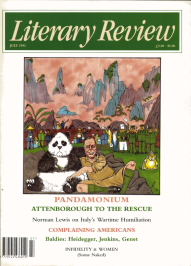Roger Caldwell
Politically Incorrect
Martin Heidegger: A Political Life
By Hugo Ott (Translated by Allan Blunden)
HarperCollins 356pp £20
The days are long gone when philosophers in the Anglo-Saxon tradition could airily dismiss Heidegger’s magisterial Being and Time as based on a mistake of language. His central importance in twentieth-century thought is now unquestioned. Sartrean existentialism, the philosophical hermeneutics of Gadamer and the deconstructionism of Derrida all have acknowledged roots in the work of Heidegger. His late writings which depict mankind as the ‘custodian of Being’ fit well with the ecological concerns of the present-day, and his advocacy of ‘thinking’ as opposed to ‘philosophising’ is in accordance with a growing suspicion of the worth and adequacy of philosophical systems as such. Along with this widespread recognition of the power and profundity of his thought, however, it is also necessary to take stock of the fact that Heidegger was an enthusiastic proponent of National Socialism and an admirer of Hitler.
There have been attempts to downplay the Nazi connection by his admirers and, not least, by Heidegger himself. Hugo Ott, as a historian rather than a philosopher, has undertaken the task of documenting the extent and nature of his involvement with the movement. Whilst there may be cavillings at some of his interpretations, there can be little doubt that his findings are based on scrupulous attention to the available documentary sources. There can be little serious doubt either as to the truth of his general conclusion that Heidegger’s associations with National Socialism were deeper and longer-lasting than has generally been recognised, and that Heidegger’s own subsequent statements about the matter were evasive and inadequate at best, and often downright mendacious. Indeed, it is questionable whether Heidegger ever recognised that he had been fundamentally mistaken in his espousal of the Nazi cause; nowhere in his writings is there an unequivocal disavowal of his former enthusiasms.
In a letter to Jaspers, Heidegger once spoke of ‘two thorns in my flesh – the struggle with the faith of my birth, and the failure of the rectorship’. The faith of his birth was Catholicism. Heidegger’s upbringing was as a child of humble origins in the conservative and devoutly

Sign Up to our newsletter
Receive free articles, highlights from the archive, news, details of prizes, and much more.@Lit_Review
Follow Literary Review on Twitter
Twitter Feed
Under its longest-serving editor, Graydon Carter, Vanity Fair was that rare thing – a New York society magazine that published serious journalism.
@PeterPeteryork looks at what Carter got right.
Peter York - Deluxe Editions
Peter York: Deluxe Editions - When the Going Was Good: An Editor’s Adventures During the Last Golden Age of Magazines by Graydon Carter
literaryreview.co.uk
Henry James returned to America in 1904 with three objectives: to see his brother William, to deliver a series of lectures on Balzac, and to gather material for a pair of books about modern America.
Peter Rose follows James out west.
Peter Rose - The Restless Analyst
Peter Rose: The Restless Analyst - Henry James Comes Home: Rediscovering America in the Gilded Age by Peter Brooks...
literaryreview.co.uk
Vladimir Putin served his apprenticeship in the KGB toward the end of the Cold War, a period during which Western societies were infiltrated by so-called 'illegals'.
Piers Brendon examines how the culture of Soviet spycraft shaped his thinking.
Piers Brendon - Tinker, Tailor, Sleeper, Troll
Piers Brendon: Tinker, Tailor, Sleeper, Troll - The Illegals: Russia’s Most Audacious Spies and the Plot to Infiltrate the West by Shaun Walker
literaryreview.co.uk